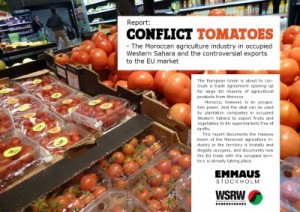An interesting article in The Guardian yesterday mentioned the term ‘conflict tomatoes’ –a remarkable term given its legacy in denouncing corporate complicity with financing warfare (images of the movie Blood Diamond immediately spring to mind, but also of coltan, and Congo). Echoing my earlier post on heterogeneous market associations, the Guardian writes how British consumers in particular are being consciously misled. Sweet mixed baby tomatoes sold by supermarket giants Tesco and Morrisons, and which have been labeled as produce of Morocco, in fact are cultivated by giant agribusinesses in the contested area of the Western Sahara. Some of these businesses are property of the wealthy King Mohammed VI, others of powerful Moroccan conglomerates and French multinational firms.
The term conflict tomatoes first came up in a joint WRSW-Emmaus report produced last month, which denounces the upcoming trade agreement between the EU and Morocco that will open the Union for large imports of agricultural products from Morocco. Morocco, however, is an occupation power, it writes. And the deal can be used by plantation companies in occupied Western Sahara to export fruits and vegetables to EU supermarkets free of tariffs and under the veneer of a an internationally ratified agreement.
I am curious to what extent research will follow up on the effects the massive displacement this extensive agricultural production rise will obviously generate both locally and transnationally (in the same logic as West African farmers now are joining the ranks of Europe’s precarious labour force in the agricultural sector as a result of aggressive capitalist expansion they face at home).
At the same time, the terminology of the ‘conflict tomato’ also opens up a whole new spectrum towards this kind of aggressive agricultural frontier developing in and South of the Sahara. Contrarily to the earlier campaigns against conflict diamonds that concentrated predominantly on the role of non-state actors and shady businessmen, for example, advocacy organizations like WSCUK are explicitly criticizing the role of states and multinational corporations. Maybe this ‘unusual take’, as the Guardian calls it, will also help enrich the conceptual scope of the conflict minerals debate towards a wider critical understanding on such changing global constellations of economic appropriation and development.



